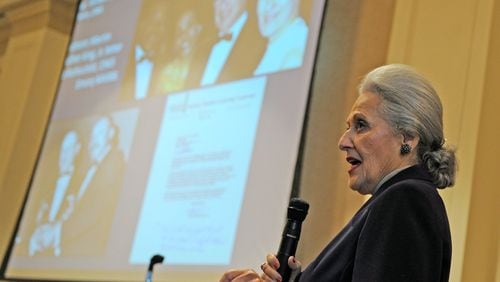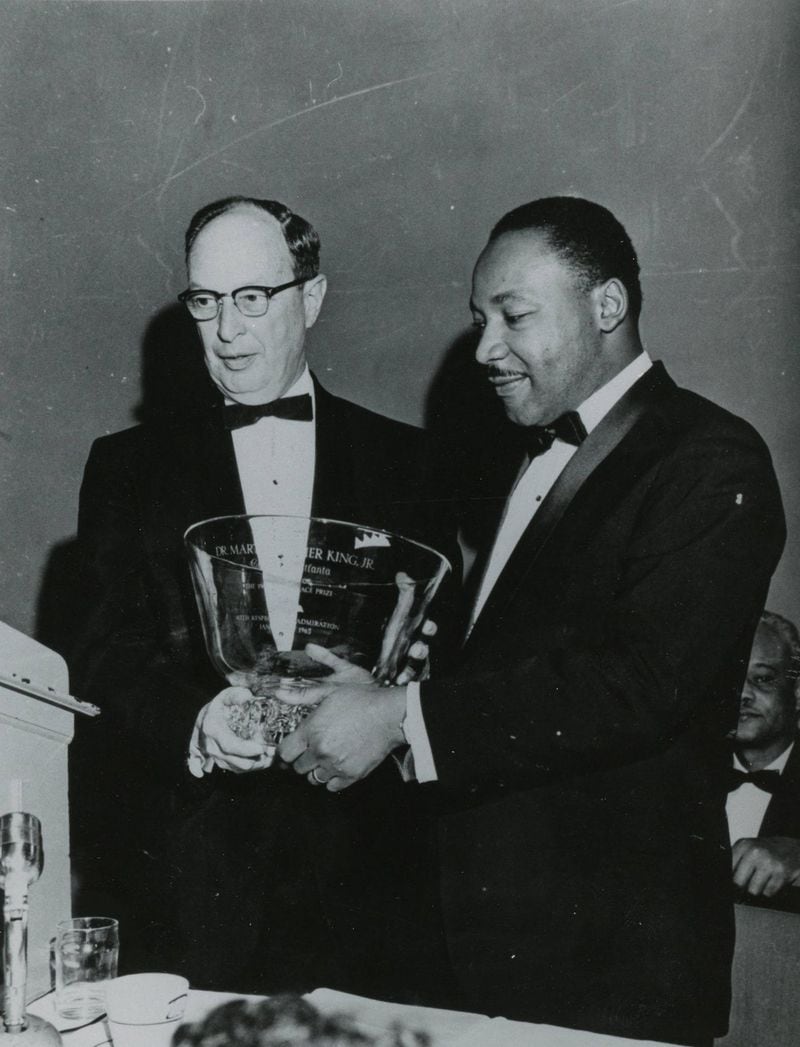History threw Janice Rothschild Blumberg into the path of some of the 20th century’s most important players. She grasped her role with relish and grace, made her own impact on the world and turned her experiences into a career as a writer, historian, public speaker and matriarch of Atlanta’s Jewish community.
Blumberg died of complications of age Feb. 21. She was 100.
Born on Feb. 13, 1924, Janice Oettinger grew up in Atlanta, attended the University of Georgia and worked for the U.S. government before returning home in 1946. She met and married Jacob Rothschild, rabbi at The Temple, the city’s oldest Jewish congregation. The Rothschilds were early white supporters of the civil rights movement, Rabbi Rothschild first condemning segregation in a 1947 sermon. Blumberg served on the National Conference of Christians and Jews. It was the Rothschilds and a few supporters who battled indifference and opposition from the city’s white power brokers in 1964 to organize a celebratory dinner for the Rev. Martin Luther King Jr. after he was awarded the Nobel Peace Prize.
Common work and travail drew the couple close to the Kings. Rabbi Rothschild’s work with King and on behalf of others who suffered prejudice, including as his own people, also made him a target. In 1958 The Temple was bombed.
Determined to celebrate King’s world-wide recognition for the Nobel Peace Prize, the group of supporters had to hammer out details for the dinner quickly. Blumberg tackled the challenge of lining up a commemorative gift — a high-end Steuben engraved glass bowl.
“She called Steuben and they said, ‘We can’t get it to you in time because our workers take a week off at the end of the year. And we’ll do it for this price,’” said her son Bill Rothschild.
His mother reiterated to Steuben that they needed the piece within days and that the price exceeded her budget. Then she dropped the clincher. “This is for Dr. Martin Luther King, Jr. who just won the Nobel Peace Prize.”
Silence on the line. Then, “Call me back tomorrow.”
The next day, she was told the workers agreed to make the bowl, and Steuben would do it at her price.
Blumberg employed her persuasiveness, enthusiasm, charm, intellectual curiosity and a ability to bring people together to good causes throughout her life. She also built a career based on her love of Jewish history and fierce support for the civil rights movement.
“She created a sisterhood of leaders in the civil rights movement,” said historian Mark Bauman, who worked with her on several projects.
Long attracted to wielding the pen, she also began writing articles that appeared in local publications.
“She managed to tell historical stories in such a way that people could really relate to them and understand them,” said Rabbi Peter Berg of The Temple.
Bill Rothschild said The Temple’s 100th anniversary in 1967 gave his mother a chance to expand her writing. She was more than 40 years old when she penned a book on the history of The Temple, “As But a Day,” for its centennial.
“Up till then, most congregational histories were someone going through the minutes and saying who the rabbi was back then and when a building was built,” he said. Her meticulous research, vivid descriptions of the life and times of various figures and clear, engaging prose “changed the way congregational histories were written,” Rothschild said.
Believing that local Jewish stories needed to be told, she embarked on an extensive series of books and articles covering such topics as the lives of her husband and her grandfather, who had also been a prominent American rabbi. She also wrote about the 1958 bombing of The Temple by white supremacists.
Bauman said Blumberg’s front-row seat to notable happenings set her up for her work.
“She was born into it, “Bauman said. “She was history.”
Janice lived through every major news event that affected southern Jews from the 1930s until her death, said Jay Silverberg, a retired journalist and friend.
Her passionate involvement in Jewish history, arts and culture did not diminish after the death of Jacob Rothschild from a heart attack in 1973. She later married David Blumberg, the head of the Jewish advocacy organization B’nai B’rith International. She served on the organization’s Klutznick National Jewish Museum and also as president of the Southern Jewish Historical Society. The Blumbergs traveled the world, meeting and working alongside such luminaries as Israeli Prime Minister Golda Meir and President Jimmy Carter.
Age didn’t slow her drive, and she continued speaking and writing into her 90s. Her final book was “What’s Next?: Southern Dreams, Jewish Deeds and the Challenge of Looking Back while Moving Forward.”
The then 98-year-old Blumberg labeled it as “a collection of memories that I can put down for anybody that’s interested in the future.“
She added, “You know old people love to talk about what they’ve done. I’m trying to save family and friends by writing it instead of having to tell it.”
She is survived by her son Bill Rothschild (Brenda), and many grandchildren and extended family members. A memorial service will be held at 2 p.m. Monday, March 11, at The Temple, 1589 Peachtree Street NE, Atlanta.







